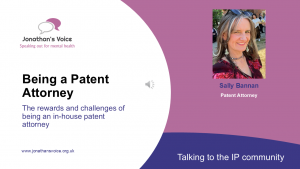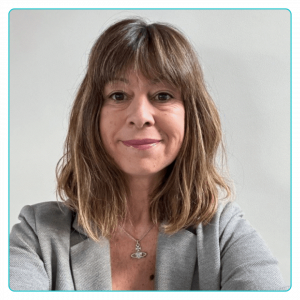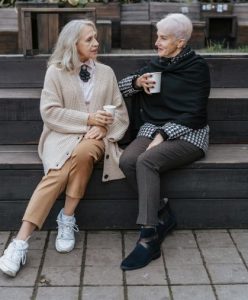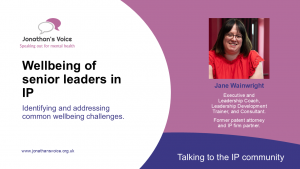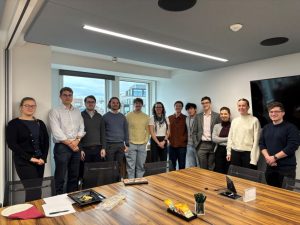On 11 May 2022 we at Jonathan’s Voice were very pleased to hold a webinar in collaboration with IPInclusive to mark Mental Health Awareness Week. The post below which was written by Susan Nelson (an intern for IP Inclusive) first appeared on the IP Inclusive website and we are grateful for their permission to post it here.
“On 11 May 2022 we held a webinar in collaboration with Jonathan’s Voice to mark Mental Health Awareness Week. The webinar featured a panel which included representatives from each of the six IP Inclusive communities (IP & ME, IP Ability, IP Futures, the IP Non-traditional Family Network, IP Out and Women in IP). Their discussions were chaired by mental health trainer and consultant Penelope Aspinall, who works with Jonathan’s Voice and chairs their Advisory Board.
The theme for the event was the intersections between mental health and diversity. The panel also touched on the topic of loneliness and isolation. It was a particularly powerful event since each panel member candidly shared their own personal experiences.
This blog post, written by Susan Nelson (an intern for IP Inclusive), highlights the key points that were discussed.”
Susan writes:
The event started with a discussion of some of the key findings from LawCare’s 2020/21 Life in the Law report. This report found that those in marginalised groups tend to experience worse mental health. For example, people from ethnic minority backgrounds had higher levels of burnout than their white counterparts. The report highlighted that there is a link between mental health and diversity – making it clear that this is a theme worth understanding.
THE MEANING OF INTERSECTIONALITY
The panel then went on to discuss what intersectionality means to them. There were several themes that emerged.
Firstly, intersectionality can mean belonging to multiple marginalised groups. One panel member explained that often people will have many categories that could be applied to them. Similarly, within each marginalised group, there can be lots of diversity. For example, there are different kinds of disabilities, making this group itself diverse and unique.
Secondly, an individual may not be aware of their own intersectionality or minority characteristics. Several panel members had different experiences of this. One member discussed how she did not see herself as intersectional. It was not until she began researching this topic that she discovered she was – being a woman who suffers from mental health issues. Another panel member shared how their understanding of their own intersectionality is something which evolved over time. This individual did not realise they were neurodivergent until their early 20s.
Thirdly, those in minority groups often feel a need to prove themselves, which intersects negatively with their mental health. This was a feeling shared by several of the panel members. One discussed how being a woman, she felt a pressure to be perfect. There was an expectation to look and act in a certain way to get and stay ahead. This need to be perfect was exhausting and ultimately led to poor mental health. Panel members who were single parents and those from minority ethnic backgrounds also spoke about feeling a similar pressure. The pressure to appear professional among their colleagues meant they were less inclined to ask for help and share workloads. Eventually, this led to feelings of burnout.
Finally, being part of multiple marginalised groups can have a cumulative impact on an individual’s mental health. The panel drew on research from the Interlaw Diversity Forum. Here, it was found that gay white men have better outcomes than gay white women who in turn have better outcomes than gay black women. The reason behind this is that experiencing multiple oppressions and prejudices can have a cumulative effect, which over time increases an individual’s risk of poor mental health.
THE IMPACT ON LONELINESS
Next, the panel looked at the themes of loneliness and isolation.
As a starting point, one of the panel members discussed that feelings of loneliness are made worse by having a marginalised characteristic. For example, being from an ethnic minority background means a person’s differences are physically visible. This can make it relatively easy for an individual to see themselves as different to others, leading to feelings of shame. In turn, this can result in feeling isolated.
Following on from this, the panel discussed how the IP professions generally can be lonely. IP professionals often work alone and are working to tight deadlines. This independent workstyle was also exacerbated during the pandemic.
One of the panel members also commented that it is possible to have a lack of awareness of your own loneliness. In this case, the individual was so busy throughout their career that they did not actually realise how isolated they were until it was pointed out by a friend. This suggests that we should all check in more often with ourselves to ensure we keep connected to others.
WHAT CAN WE DO ABOUT THIS?
The panel concluded the event by sharing different measures that can be adopted to combat feelings of loneliness and isolation.
One way is to reach out for professional help and undertake therapy or counselling. This provides a safe space to offload certain issues.
Another measure to abate loneliness is to build a support network within your organisation. In times of need, you can then turn to this support network for help. This network will also help build your resilience.
Finally, you could attend IP Inclusive events or join one of the six IP Inclusive communities. The panel praised the IP Inclusive events saying there was a great benefit in finding people who share similar experiences as yourself or who are in the same situation as you. Individuals can connect over their differences, and it can be liberating speaking about certain issues that are specific to your marginalised characteristic.
Clearly, there is a link between mental health, diversity and loneliness. However, IP Inclusive can help to reduce these negative feelings through its events and support communities. Ultimately, these provide everyone with the opportunity to meet like-minded people, share experiences and support one another.
ADDITIONAL SUPPORT
If you feel like you need some additional support, please reach out to any of the following resources:
- Your local GP or practice nurse
- In a crisis, call 111, 999, or go to A&E
- Hub of Hope – https://hubofhope.co.uk/
- Samaritans – https://www.samaritans.org/ ; 116 123
You can find details of the webinar here, and access Penelope Aspinall’s slides here.
[Susan’s internship has been kindly organised and funded for IP Inclusive by Clifford Chance.]


